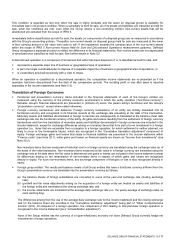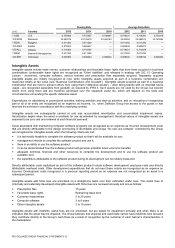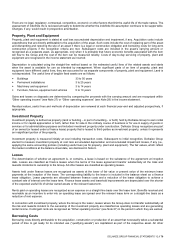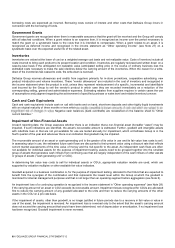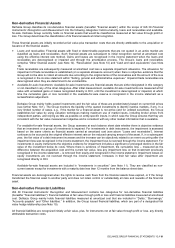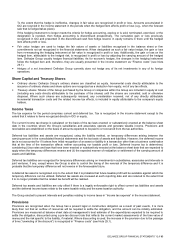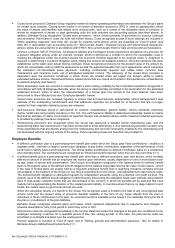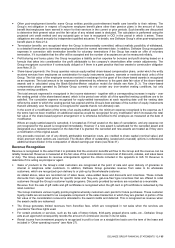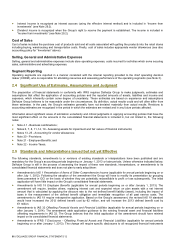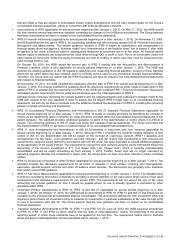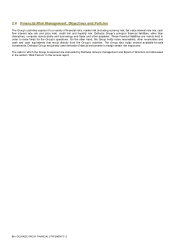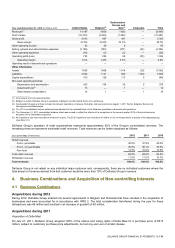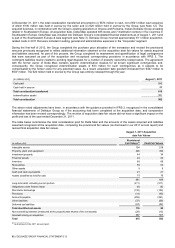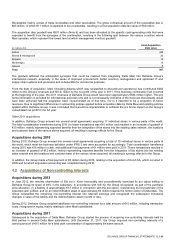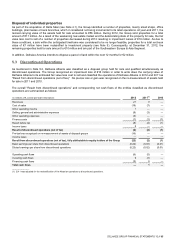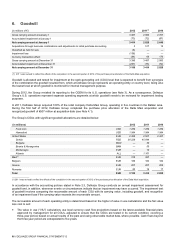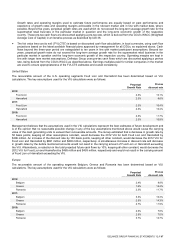Food Lion 2012 Annual Report Download - page 89
Download and view the complete annual report
Please find page 89 of the 2012 Food Lion annual report below. You can navigate through the pages in the report by either clicking on the pages listed below, or by using the keyword search tool below to find specific information within the annual report. DELHAIZE GROUP FINANCIAL STATEMENTS ’12 // 87
that are offset or that are subject to enforceable master netting arrangements and will have limited impact on the Group’s
consolidated financial statements, mainly in connection with financial derivative contracts.
Improvements to IFRS (applicable for annual periods beginning after January 1, 2013): On May 17, 2012, the IASB issued
the final omnibus annual improvements standard containing six changes to five IASB pronouncements. The Group believes
that these amendments will have no impact on the consolidated financial statements.
IFRS 9 Financial Instruments (applicable for annual periods beginning on or after January 1, 2015): On November 12, 2009,
the IASB published the first part of IFRS 9, the accounting standard that will eventually replace IAS 39 Financial Instruments:
Recognition and Measurement. The revised guidance included in IFRS 9 relates to classification and measurement of
financial assets alone and applies a “business model” and “characteristics of the financial asset” test to assess if, after initial
recognition at fair value, a financial asset is subsequently measured at amortized cost or at fair value. All financial assets
that are equity investments are measured at fair value either through OCI or profit or loss. This is an irrevocable choice the
entity makes by instrument unless the equity investments are held for trading, in which case they must be measured at fair
value through profit or loss.
On October 28, 2010, the IASB issued the second part of IFRS 9 dealing with the Recognition and Measurement of
Financial Liabilities, which is also applicable for annual periods beginning on or after January 1, 2015. The IASB has
retained the existing guidance in IAS 39 regarding classifying and measuring financial liabilities, except for those liabilities
where the fair value option has been elected, which is currently not the case for any of Delhaize Group's financial liabilities.
Therefore, the Group does not expect that the IFRS 9 guidance will have an impact on its consolidated financial statements
with respect to financial liabilities.
On December 16, 2011, the IASB modified the mandatory effective date of IFRS 9 for annual periods beginning on or after
January 1, 2015. The change modified the guidance about the disclosure requirements an entity needs to make when it first
applies IFRS 9. In parallel with the amendment of IFRS 9, the IASB also modified IFRS 7 Financial Instruments: Disclosures
and added specific requirements that an entity should disclose upon the initial application of IFRS 9.
Delhaize Group continues reviewing the revised guidance and the ongoing progress and subsequent changes made by the
IASB with respect to the new standard in order to assess the full impact IFRS 9 might have on its consolidated financial
statements, but will only be able to conclude once the IASB has finalized the development of IFRS 9, including the remaining
phases on hedge accounting and impairment.
IFRS 10 Consolidated Financial Statements and Amendments to IAS 27 Separate Financial Statements (applicable for
annual periods beginning on or after January 1, 2013). IFRS 10 builds on existing principles by identifying the concept of
control as the determining factor in whether an entity should be included within the consolidated financial statements of the
parent company. The standard provides additional guidance to assist in the determination of control where it is difficult to
assess. The remaining guidance of IAS 27 deals now solely with separate financial statements. The Group concluded that
the implementation of IFRS 10 will have no material impact on its consolidated financial statements.
IFRS 11 Joint Arrangements and Amendments to IAS 28 Investments in Associates and Joint Ventures (applicable for
annual periods beginning on or after January 1, 2013): Although IFRS 11 modifies the currently existing definition of joint
control of IAS 31, the determination will still be based on the concept of unanimous consent. IFRS 11 classifies joint
arrangements into two types - joint operations and joint ventures - and will require that investments in joint ventures are
accounted for using the equity method in accordance with IAS 28, which has been amended to include additional guidance
on the application of the equity method. The requirement to account for joint ventures using the equity method will impact the
accounting of the Group's investment in P.T. Lion Super Indo, LLC (“Super Indo”) which is currently proportionately
consolidated and will be equity accounting as from January 1, 2013. Further, Super Indo will no longer represent an
operating segment. Besides the investment in Super Indo, the Group does not have any other interest in jointly controlled
entities.
IFRS 12 Disclosures of Interests in Other Entities (applicable for annual periods beginning on or after January 1, 2013): The
standard includes the disclosure requirements for all forms of interests in other entities, including joint arrangements,
associates, special purpose vehicles and other off balance sheet vehicles. The disclosures are generally more extensive
than under current IFRS guidance.
IFRS 13 Fair Value Measurements (applicable for annual periods beginning on or after January 1, 2013): The standard aims
to improve consistency and reduce complexity by providing a precise definition of fair value and a single source of fair value
measurement and disclosure requirements for use across IFRS. The requirements will not extend the use of fair value
accounting but provide guidance on how it should be applied where its use is already required or permitted by other
standards within IFRS.
Investment Entities: Amendments to IFRS 10, IFRS 12 and IAS 27 (applicable for annual periods beginning on or after
January 1, 2014): On October 31, 2012, the IASB issued an amendment to IFRS 10, IFRS 12 and IAS 27 that introduced an
exception to the principle that all subsidiaries shall be consolidated. This amendment defines the term investment entity and
requires a parent that is an investment entity to measure its investments in particular subsidiaries at fair value through profit
or loss in accordance with IAS 39. The Group expects that the new guidance will have no impact on its consolidated
financial statements.
Transition Guidance (Amendments to IFRS 10, IFRS 11 and IFRS 12): On June 28, 2012, the IASB issued an amendment
to IFRS 10, IFRS 11 and IFRS 12 which clarifies that the ”date of initial application” means ”the beginning of the annual
reporting period” in which these standards have to be applied for the first time. The requirement means that for Delhaize
Group the date of initial application of these standards will be January 1, 2013.


